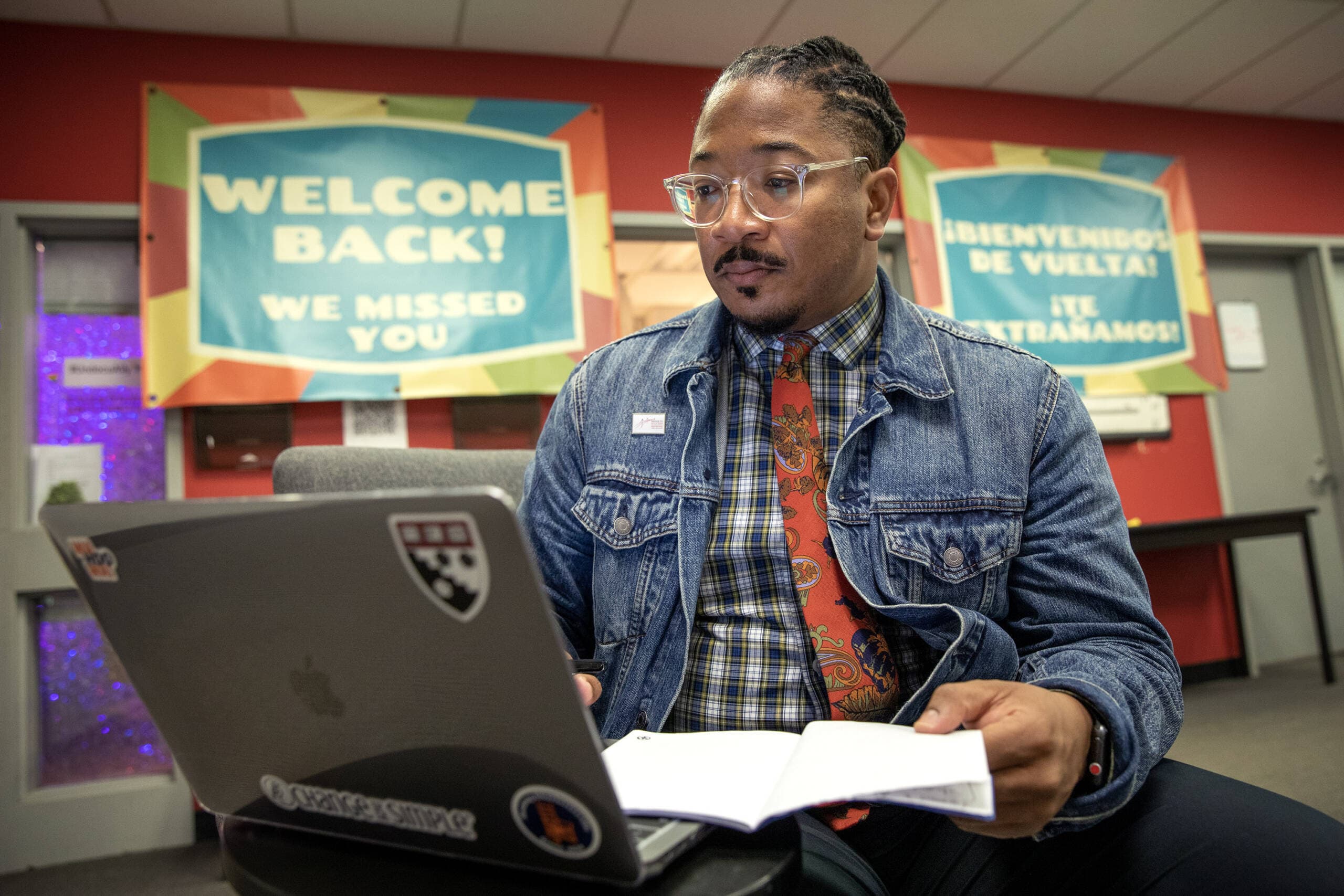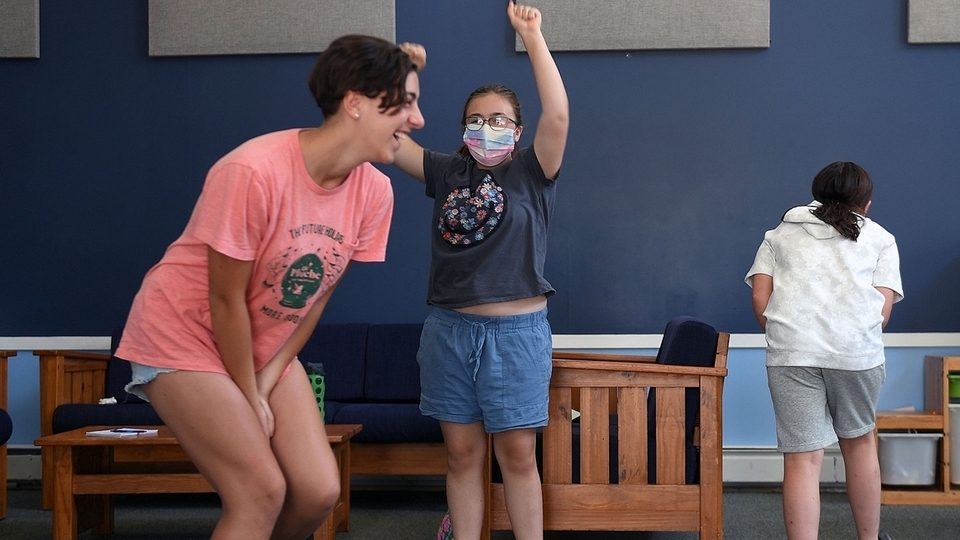[ad_1]
When Ayla started the ninth grade this school year at Acton-Boxborough Regional High School, she felt a bit overwhelmed. She was in a new building, with new teachers, classes and peers.
“It was definitely a new experience and yeah, it was very stressful in the beginning,” Ayla said.
Ayla would frequently visit her school counselor’s office. She said she experienced anxiety and depression ever since fifth grade, when her parents divorced. By the end of sixth grade, remote schooling during the pandemic changed the nature of friendship and social relationships. Major transitions such as middle school, and now high school, were hard to navigate. (WBUR is using Ayla’s first name only to respect the family’s request for privacy due to the potential stigma of receiving mental health care.)
Ayla’s mother tried to find her a therapist but came up short.
“We had started looking into getting some mental health plan in place with therapists that just kept hitting one roadblock after the next,” Kim Russell said.
Some places cited waitlists of over a year and available providers didn’t accept her insurance, which meant the fees would be too high for them to afford.
But then Ayla’s school counselor suggested a new telehealth therapy service offered through a school partner. Russell submitted a consent form and 24 hours later, she received a call from the provider, Cartwheel Care, offering to set her daughter up with an appointment within a week.
“I mean, I was floored,” Russell said. “There was really not a huge delay and not a huge gap in between [referral and contact].”
The new partnership comes amid an unprecedented decline in youth mental health in the past decade. The percentage of U.S. high schoolers experiencing persistent feelings of sadness or hopelessness soared from 28% in 2011 to 42% by 2021, according to the Centers for Disease Control and Prevention.
In Massachusetts, kids aged 3 to 17 saw a 50% increase in anxiety and depression diagnoses from 2016 to 2020, according to the 2022 Kids Count Data Book. That’s almost double the national average increase for that time period.
But access to providers has remained a hurdle. Some Massachusetts’ school districts are now exploring new ways to help address youth mental health needs. This school year, 15 districts have partnered with Cambridge-based mental health care startup Cartwheel Care to offer short-term virtual therapy. While schools have worked with community mental health providers before, what’s different here is the exclusively school-based referral and emphasis on minimizing wait times for students during a time of high demand for behavioral health care services.
“The unique niche is providing short-term care and reducing the response rate,” said Peter Light, superintendent of Acton-Boxborough Regional School District. “Of students referred, all started telehealth therapy within the first week of referral. In the world of mental health, that is very rapid.”
By providing telehealth rather than in-person services, Cartwheel is able to reduce wait times, according to CEO and co-founder Joe English. It also allows the company to hire experienced and diverse clinicians from around the state.
There are other advantages — such as serving kids in rural areas who struggle with transportation, English added.
“Virtual care can be a game changer for kids who are looking for rapid access to really high quality mental health care,” he said.
But he acknowledged some limitations for certain emergency cases, such as active psychosis.
The company coordinates with school counselors and social workers since they’re the ones who interact with students in person and are best positioned to identify students’ needs. Staff make referrals and parent consent for minors is required. Short-term virtual therapy is available to students in elementary grades up to high school, ranging from two to six months.
“We see ourselves as an extension of the school’s care team in a lot of ways. Over the course of treatment, we are very collaborative with that school team,” English said.
The company, which was founded last May with $4 million in venture capital, has a leadership team that has prior experience in education and health policy. It currently employs 20 licensed therapists and child-adolescent psychiatrists, some of whom can speak other languages including Spanish, Portuguese, Cape Verdean Creole, Korean and Mandarin Chinese. Full-time “care coordinators” also work to find some students longer-term care.
“They do have bilingual, culturally responsive therapists which is vitally important, particularly for Chelsea, where 90-plus percent of the district is Latinx,” said Aaron Jennings, the district’s equity, diversity and excellence officer. Chelsea Schools also began using Cartwheel for high schoolers last fall.

Nationwide, virtual mental health support for students is becoming more prevalent, with 13 of the country’s 20 largest school districts adopting teletherapy since the pandemic, according to a Chalkbeat analysis.
While 70% of public schools across the country reported an increase of students who are seeking mental health services, only half of school districts said they were equipped to provide needed care.
This is true even of school districts that have bolstered their student support staff with more counselors or social workers since the pandemic.
Following the pandemic, up to 15% of roughly 1,600 students at Chelsea High School reached out to school counselors, said Jennings. On top of existing challenges, they experienced food insecurity or unstable home environments during the pandemic.
“Our students came back to us with extra levels of care needed,” he said. Dozens of Chelsea High students have used Cartwheel since it began last fall. “They can connect with [therapists] outside of the school day. That is an extreme value-add,” Jennings said.
Cartwheel accepts 95% of insurers in Massachusetts, according to English. Since it’s an in-network provider for Medicaid, there is no co-pay for kids on MassHealth. Districts cover costs that are not billable to insurance, such as staff training or parent education series. Whether the partnership is sustainable over the long term depends on districts’ level of investment.
Light, the Acton-Boxborough superintendent, said the district devoted $130,000 in American Rescue Plan Act funds to pay for the service for an entire school year. In order to continue the service in the future, he said the district has created a multi-year plan to budget it in.
“So far there’s been an extraordinarily high satisfaction rate expressed by families,” he said.”
Ayla, the ninth grader, said she met with a Cartwheel clinician for about a month. Her therapist helped her learn coping and grounding skills and helped put her in touch with longer-term therapist.
“She taught me quite a lot,” the teen said. “It definitely helped with my mental health in general.”
[ad_2]
Source link



